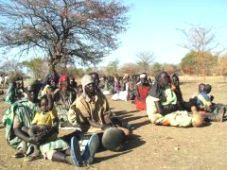12,000 people affected by demolitions outside Khartoum
Aug 17, 2006 (KHARTOUM) — The United Nations Mission in Sudan (UNMIS) on Thursday expressed grave concern at the forced relocation of 12,000 people from Dar al Salaam camp for displaced Sudanese on the southern outskirts of the capital and the ongoing destruction of their dwellings by Khartoum state authorities.
 “Residents said bulldozers had begun demolishing hundreds of houses at around 8am that [Wednesday] morning, with hardly any notice [given] to families,” UNMIS said in a statement.
“Residents said bulldozers had begun demolishing hundreds of houses at around 8am that [Wednesday] morning, with hardly any notice [given] to families,” UNMIS said in a statement.
“A United Nations verification mission to the area witnessed heavily armed policemen and tanks stationed around the community,” the statement added. “The UN mission also heard gunshots before being refused entry and told to leave the area. Reports have been received of deaths and injuries of residents within the camps, including the death of a child.”
The state authorities could not be reached for comment.
The residents of Dar al Salaam camp have lived on the current site for more than two decades. Many fled from south and western Sudan during a famine in the 1980s. Sudan’s 21-year civil war ended with a peace deal in 2005, but about two million southern Sudanese remain in camps around Khartoum, unable to return home due to a lack of basic services in the south.
“The United Nations is deeply concerned about this incident, particularly in view of the fact that both the authorities and the residents had signed a Memorandum of Understanding stating that the residents of Dar al Salaam would not be relocated from their existing homes until a site acceptable to both parties had been found,” the statement observed.
UNMIS demanded an immediate cessation of the demolitions and requested access to the area to assess the humanitarian situation and the affected population’s needs.
Forced relocations have become increasingly common in and around Khartoum as land values have skyrocketed, forcing millions of primarily southern Sudanese to move from their small plots of land.
The displaced are often forced further away from the city to desert areas and slums that lack even basic services.
Meanwhile, the Special Rapporteur of the UN Commission on Human Rights, Sima Samar, told reporters in Khartoum on Thursday that Sudan’s human rights record in its western Darfur region remained poor and the authorities were not doing enough to prevent attacks against civilians or to prosecute those responsible for war crimes.
The UN envoy added that a culture of impunity prevailed in Darfur, which has been plagued by escalating violence since the signing of a peace accord in May.
“There is not only a lack of prevention and protection but also lack of justice for the crimes that are committed, whether it is killing, rape or destruction of property,” Samar said.
The UN envoy said that special criminal courts set up to try suspected Darfur war criminals had failed to bring justice to the victims.
Sudan set up its criminal court in 2005, after the international community demanded that Darfur war crimes suspects be tried by the International Criminal Court in The Hague.
The Sudanese government adamantly refused, insisting it could try suspected war criminals through national courts. But those courts have tried very few cases so far and Samar had observed little improvement since her last visit in March.
The Darfur conflict has raged for three years after rebels in the remote region attacked government positions, complaining that the area remained undeveloped due to political and economic marginalisation.
Sudan is charged with arming local militias to crush the rebellion. The militias, known as Janjawid, embarked on a scorched-earth campaign of rape and murder in which more than 200,000 people have died and millions have been displaced.
(IRIN)
